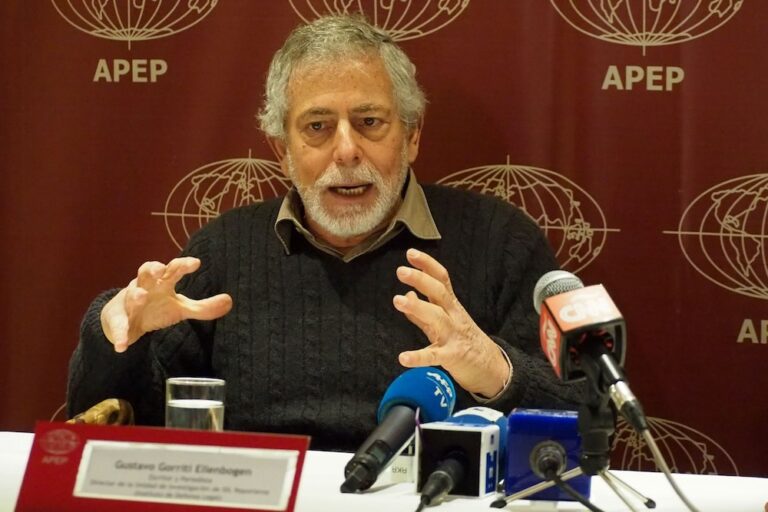(IPYS/IFEX) – In the early morning of 15 July 1999, via the ruling party’s majority vote, Congress approved a law that would impede the motion presented by the editor of the “Caretas” magazine, Enrique Zileri. Zileri received a suspended prison sentence and was ordered to pay US$10,000 in civil damages, after Vladimiro Montesinos, advisor to […]
(IPYS/IFEX) – In the early morning of 15 July 1999, via the ruling party’s
majority vote, Congress approved a law that would impede the motion
presented by the editor of the “Caretas” magazine, Enrique Zileri. Zileri
received a suspended prison sentence and was ordered to pay US$10,000 in
civil damages, after Vladimiro Montesinos, advisor to the National
Intelligence Service (Servicio de Inteligencia Nacional, SIN), charged him
for defamation.
**Updates IFEX alert of 12 May 1999**
The proposed law, ratified by Anselmo Revilla, a governing party member and
former president of the Congressional Human Rights Commission, allows a
convicted person to ask for a special re-examination of her/his case within
a maximum time period of six months, thus modifying the Code of Criminal
Procedure, which did not set a time limit for the presentation of such
motions.
Zileri was charged in 1990 by Montesinos, an advisor to and presumed chief
of SIN, after an article was published in “Caretas”. In the article,
Montesinos was characterized as “Rasputín”, in reference to his role in the
inner circle close to President Alberto Fujimori, and he was identified as a
SIN advisor. Montesinos denied occupying this post, and, based on this
argument, Zileri was sentenced in 1991.
On 25 April, Montesinos appeared in a television interview, with President
Fujimori, while the latter was speaking about the rescue of the hostages
held in the Japanese ambassador’s residence. During the interview,
Montesinos admitted that: “I have been living here in these premises (of the
SIN) for nine years, working twenty-four hours a day, as President Fujimori
well knows, and I have solely foucsed on fulfilling the duties of the post.”
Prompted by these statements, Zileri and his lawyer, Alberto Borea, asked
for a re-examination of the sentence on the grounds that this new evidence
pointed to Zileri’s innocence.
The Code of Criminal Procedure specifies that a re-examination of a sentence
can be requested, when facts, which had not been taken into account during a
trial, become known after the sentence is passed, and which can help
establish the convicted person’s innocence. With the recent approval of a
time limit of six months, Zileri’s intent to benefit from such a motion
would be thwarted, as he did not present his appeal until 11 May 1999.
Recommended Action
Send appeals to authorities:
sentence
be revised with absolute impartiality
Appeals To
Alberto Fujimori Fujimori
President of the Republic
Fax: +51 1 427 6722 / 426 6535Jorge Santistevan de Noriega
Ombudsman
Fax: +51 1 426 6657Víctor Raúl Castillo Castillo
President of the Peruvian Supreme Court
Fax: +51 1 428 0803María Carlota Valenzuela
Minister of Justice
Fax: +51 1 422 3577
Please copy appeals to the source if possible.


